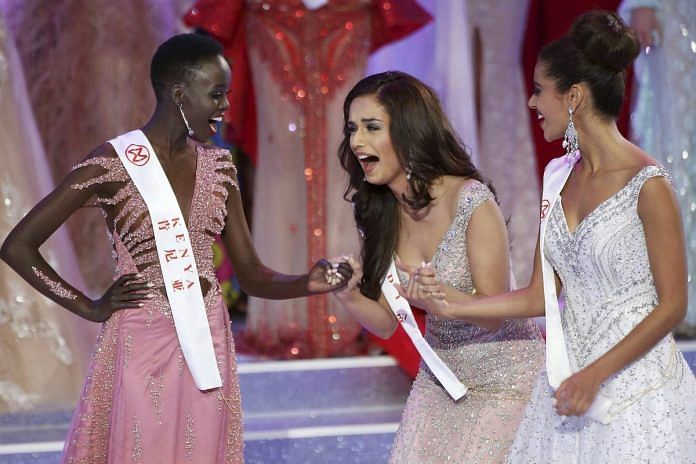To laud Manushi Chhillar, people & ministers alike invoke ‘Beti Bachao’, claim it’s a sign of Haryana’s changing gender reality under BJP.
Rohtak: At first, Manushi Chhillar’s name doesn’t ring a bell for people on the streets of Rohtak. But once it does, the home town of her maternal grandparents is quick to express emphatic pride at the achievement of “Haryana ki beti” (daughter of Haryana).
To be fair to them, the name only hit the headlines this weekend, for it was Saturday when Chhillar was crowned Miss World 2017. But there is already a general consensus that changing gender realities in the state have played a role in her success.
Credit to ‘Beti Bachao, Beti Padhao’
Soon after the 20-year-old medical student was crowned Miss World in Sanya, China, BJP leaders began congratulating her, and didn’t waste time linking the NDA government’s two-year-old ‘Beti Bachao, Beti Padhao’ to her success.
“This shows that the ‘Beti Bachao, Beti Padhao’ campaign is moving in the right direction. Certainly, this win will increase the pride of daughters of the state,” tweeted Haryana’s women and child development minister Kavita Jain.
Union women and child development minister Maneka Gandhi also tweeted her wishes to Chhillar Monday, using the hashtag #BetiBachaoBetiPadhao.
While residents in Rohtak cannot quite explain how the government scheme would have directly benefitted Chhillar, they largely believe that her achievement is part of the gender narrative conjured up by the BJP government in the state and across the country.
“The Prime Minister has done something brilliant by starting the ‘Beti Bachao, Beti Padhao’ scheme. No other leader has ever had such a vision,” says Chhillar’s grandfather, Chander Singh Sehrawat, a retired civil engineer living in Rohtak.
Chhillar would be more than happy to be part of this legacy in any way possible, adds Sehrawat, as he carefully cuts out news stories about his granddaughter from different publications.
Changing reality
Across Rohtak, nobody disputes the fact that more girls are going to school than ever before. While definitions of ‘equality’ markedly differ across generations, most women seem to believe that under this government, the girl child’s education is a priority like never before.
“Even if previous governments promoted it, was there ever a national emphasis on it?” asks Anita Phogat, principal of the Government Senior Secondary School in Dhamar.
Residents of Khanpur village, where Chhillar is studying medicine, are unanimous in saying that the government has been taking the campaign to educate the girl child from door to door.
“It’s very rare to find families who don’t send their girls to school now. From the PM to the CM, the entire government’s message seems to be ‘educate the girls of Haryana’, and the message has deep resonance here,” says Pooja, an engineering student at Bhagat Phool Singh Mahila Vishvavidyalaya.
Questions on female foeticide, honour crimes against women, and a skewed sex ratio (879 per 1,000 boys according to 2011 Census data) are brushed aside as ‘past realities’. School-going girls echo the sentiment. “Nowadays, parents don’t discriminate,” an overwhelming number tell ThePrint.
“I go for taekwondo classes until 7 pm after school, and my parents don’t object,” says 15-year-old Renu. “My elder sister was not given such freedoms.”
Scepticism remains
College-going girls are, however, more sceptical. “What can ‘Beti Bachao’ have to do with Manushi Chhillar?” asks a 24-year-old student from Rohtak University, who doesn’t wish to be named.
Ankita, 25, who is pursuing an M.Ed. at Rohtak University, says: “It’s human nature to associate someone else’s achievements with our own. Governments do it all the time.” Her friend Renu adds: “Ultimately, it boils down to what your family allows or doesn’t allow you to do.”
While most girls are going to school and opting for higher education, the question of marriage continues to lurk. “Will the government also say let your daughters be single till as long as they want?” Renu asks, as Ankita looks on, scandalised.
While ‘Beti Bachao, Beti Padhao’ has started a conversation around equal access to education, the precincts of the conversation remain strictly defined, adds another student of the university.
Five female students complain to ThePrint that the hostel gate shuts at 6 pm for them, while the boys’ hostel is open 24×7. “Will the government stand up against it?” asks Prashansa. “All this talk of change and empowerment is good — as long as it doesn’t involve your own daughter.”






